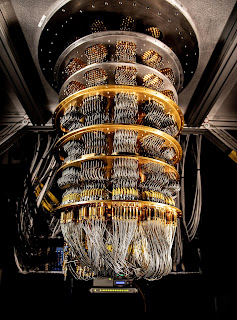Other Machines Machines
For many years, the fields of quantum mechanics and computer science formed distinct academic communities. Modern quantum theory developed in the 1920s to explain the wave–particle duality observed at atomic scales, and digital computers emerged in the following decades to replace human computers for tedious calculations. Both disciplines had practical applications during World War II; computers played a major role in wartime cryptography, and quantum physics was essential for the nuclear physics used in the Manhattan Project.
As physicists applied quantum mechanical models to computational problems and swapped digital bits for qubits, the fields of quantum mechanics and computer science began to converge. In 1980, Paul Benioff introduced the quantum Turing machine, which uses quantum theory to describe a simplified computer. When digital computers became faster, physicists faced an exponential increase in overhead when simulating quantum dynamics, prompting Yuri Manin and Richard Feynman to independently suggest that hardware based on quantum phenomena might be more efficient for computer simulation. In a 1984 paper, Charles Bennett and Gilles Brassard applied quantum theory to cryptography protocols and demonstrated that quantum key distribution could enhance information security. More details
A quantum computer is a computer that exploits quantum mechanical phenomena. At small scales, physical matter exhibits properties of both particles and waves, and quantum computing leverages this behavior using specialized hardware. Classical physics cannot explain the operation of these quantum devices, and a scalable quantum computer could perform some calculations exponentially faster than any modern "classical" computer. In particular, a large-scale quantum computer could break widely used encryption schemes and aid physicists in performing physical simulations; however, the current state of the art is largely experimental and impractical, with several obstacles to useful applications.
The basic unit of information in quantum computing is the qubit, similar to the bit in traditional digital electronics. Unlike a classical bit, a qubit can exist in a superposition of its two "basis" states, which loosely means that it is in both states simultaneously. When measuring a qubit, the result is a probabilistic output of a classical bit. If a quantum computer manipulates the qubit in a particular way, wave interference effects can amplify the desired measurement results. The design of quantum algorithms involves creating procedures that allow a quantum computer to perform calculations efficiently and quickly.
Physically engineering high-quality qubits has proven challenging. If a physical qubit is not sufficiently isolated from its environment, it suffers from quantum decoherence, introducing noise into calculations. National governments have invested heavily in experimental research that aims to develop scalable qubits with longer coherence times and lower error rates. Two of the most promising technologies are superconductors (which isolate an electrical current by eliminating electrical resistance) and ion traps (which confine a single atomic particle using electromagnetic fields).
In principle, a classical computer can solve the same computational problems as a quantum computer, given enough time. Quantum advantage comes in the form of time complexity rather than computability, and quantum complexity theory shows that some quantum algorithms are exponentially better than the best known classical algorithms. A large-scale quantum computer could in theory solve computational problems unsolvable by a classical computer in any reasonable amount of time. While claims of such quantum supremacy have drawn significant attention to the discipline, near-term practical use cases remain limited.

